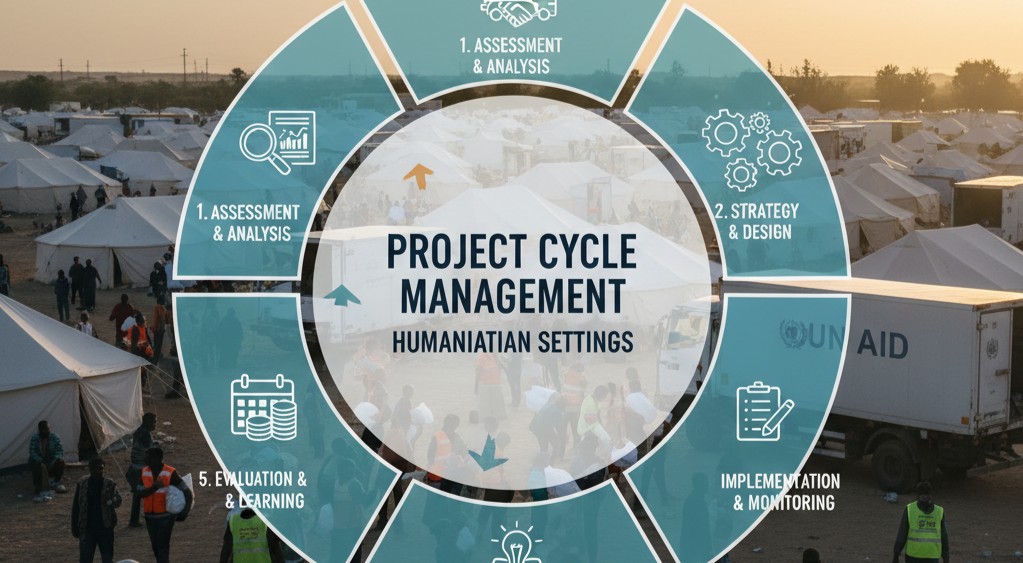
This comprehensive 5-day training course is designed to equip project professionals with the essential skills to manage the entire project lifecycle in a humanitarian context. Project Cycle Management (PCM) provides a structured and systematic approach to planning, implementing, and evaluating humanitarian interventions. This course provides a practical, hands-on approach to mastering each phase of the cycle, ensuring that projects are effective, accountable, and adaptable to the dynamic nature of a crisis.
Throughout the training, we will cover a range of topics crucial for effective PCM. You will learn how to identify and design relevant projects, use the Logical Framework Approach for planning, and implement robust monitoring and evaluation systems. The course also focuses on managing grants and reporting to donors, navigating risks, and ensuring a smooth transition or closeout. By the end of this course, you will be able to confidently manage humanitarian projects, ensuring they are both impactful and principled.
Who Should Attend the Training
Objectives of the Training
Personal benefits
Organizational benefits
Training methodology
Trainer Experience
Our trainers are seasoned professionals with extensive experience in leading and managing humanitarian projects in various contexts. They have a strong background in project management and a deep understanding of the unique challenges of the humanitarian sector. Their expertise is grounded in both theory and on-the-ground experience, ensuring a dynamic and highly relevant learning environment.
Quality Statement
We are committed to delivering high-quality training that is both engaging and effective. Our courses are meticulously designed to ensure participants not only grasp the core concepts but also gain practical skills that can be immediately applied in their professional roles. We believe in fostering a supportive and collaborative learning environment where every participant can thrive.
Tailor-made courses
Recognizing that every organization has unique needs, we offer tailor-made training courses. We can customize the content, duration, and methodology of our programs to address your specific challenges and goals. Contact us to discuss how we can create a specialized training solution for your team.
Course Duration: 5 days
Training fee: USD 1500
Module 1: Project Cycle Management Fundamentals
Module 2: Project Identification and Design
Module 3: Project Planning and Logical Framework
Module 4: Project Implementation and Monitoring
Module 5: Project Evaluation and Learning
Module 6: Grant Management and Donor Reporting
Module 7: Risk Management in Humanitarian Projects
Module 8: Stakeholder Engagement and Accountability
Module 9: Transition and Closeout
Module 10: Practical Application and Case Study
A comprehensive review of all course modules
Requirements:
Terms and Conditions
1. Discounts: Organizations sponsoring Four Participants will have the 5th attend Free
2. What is catered for by the Course Fees: Fees cater for all requirements for the training – Learning materials, Lunches, Teas, Snacks and Certification. All participants will additionally cater for their travel and accommodation expenses, visa application, insurance, and other personal expenses.
3. Certificate Awarded: Participants are awarded Certificates of Participation at the end of the training.
4. The program content shown here is for guidance purposes only. Our continuous course improvement process may lead to changes in topics and course structure.
5. Approval of Course: Our Programs are NITA Approved. Participating organizations can therefore claim reimbursement on fees paid in accordance with NITA Rules.
Booking for Training
Simply send an email to the Training Officer on training@armstrongglobalinstitute.com and we will send you a registration form. We advise you to book early to avoid missing a seat to this training.
Or call us on +254720272325 / +254725012095 / +254724452588
Payment Options
We provide 3 payment options, choose one for your convenience, and kindly make payments at least 5 days before the Training start date to reserve your seat:
1. Groups of 5 People and Above – Cheque Payments to: Armstrong Global Training & Development Center Limited should be paid in advance, 5 days to the training.
2. Invoice: We can send a bill directly to you or your company.
3. Deposit directly into Bank Account (Account details provided upon request)
Cancellation Policy
1. Payment for all courses includes a registration fee, which is non-refundable, and equals 15% of the total sum of the course fee.
2. Participants may cancel attendance 14 days or more prior to the training commencement date.
3. No refunds will be made 14 days or less before the training commencement date. However, participants who are unable to attend may opt to attend a similar training course at a later date or send a substitute participant provided the participation criteria have been met.
Tailor Made Courses
This training course can also be customized for your institution upon request for a minimum of 5 participants. You can have it conducted at our Training Centre or at a convenient location. For further inquiries, please contact us on Tel: +254720272325 / +254725012095 / +254724452588 or Email training@armstrongglobalinstitute.com
Accommodation and Airport Transfer
Accommodation and Airport Transfer is arranged upon request and at extra cost. For reservations contact the Training Officer on Email: training@armstrongglobalinstitute.com or on Tel: +254720272325 / +254725012095 / +254724452588
| Course Dates | Venue | Fees | Enroll |
|---|---|---|---|
| Mar 09 - Mar 13 2026 | Kigali | $2,500 |
|
| Feb 16 - Feb 20 2026 | Paris | $6,500 |
|

Armstrong Global Institute
Typically replies in minutes